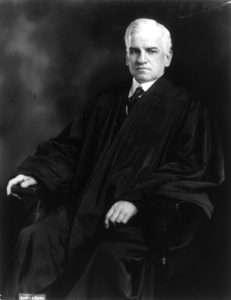The Volokh Conspiracy
Mostly law professors | Sometimes contrarian | Often libertarian | Always independent
Today in Supreme Court History: September 18, 1857
9/18/1857: Justice John Hessin Clarke's birthday.

Editor's Note: We invite comments and request that they be civil and on-topic. We do not moderate or assume any responsibility for comments, which are owned by the readers who post them. Comments do not represent the views of Reason.com or Reason Foundation. We reserve the right to delete any comment for any reason at any time. Comments may only be edited within 5 minutes of posting. Report abuses.
Please to post comments


John Hessin Clarke had a short tenure on the Supreme Court (six terms) but a long life (1857-1945).
Some stray facts. He never married. He was once part-owner of the Youngstown Vindicator, a cool newspaper name.
Clarke was a railroad counsel but became a progressive. He replaced Justice Charles Evans Hughes when Hughes resigned to run for president. William Howard Taft opposed his nomination, deeming him one of those living constitutionalist crazies.
Well, not exactly, but that did somewhat get a flavor of the vibe. Taft was firm on his concerns about the jurisprudence of the likes of Justice Brandeis. Clarke and Taft got along well on the Court during the short time their terms overlapped.
He supported various progressive positions on the Court, though he did not go along with Brandeis on free speech. Clarke's main contributions to the Supreme Court came in the areas of patent and antitrust law. It is interesting to imagine how he would have influenced the law if he had stayed on the Court during the New Deal. OTOH, health reasons guarded against that.
Clarke found the work tedious & retired at age sixty-five. He devoted himself to world peace & U.S. entry into the League of Nations. Taft was happy to see George Sutherland replace him.
Clarke did not join in the strong criticism of FDR's court expansion plan, including giving a radio address to defend its constitutionality (a limited defense, to be sure). He did not live to see the end of WWII, dying in March 1945.
In addition to hating the work, he also had to endure James Clark McReynolds, which would send me to retirement. Both were appointed by Wilson, by the way. And it was part of Clarke's decision to pursue a happier life.
Letter from John Hessin Clarke to Louis Brandeis (Sept. 13, 1922)